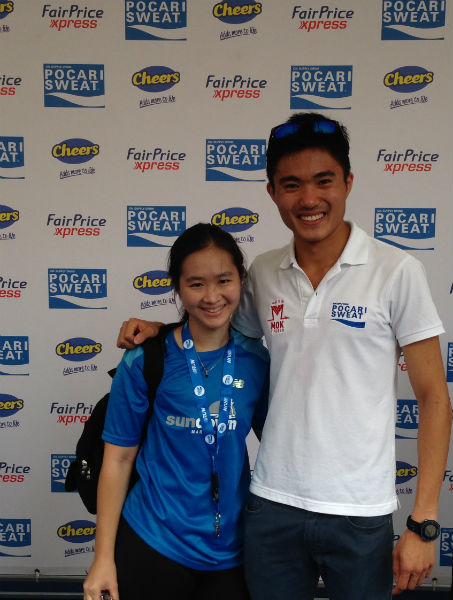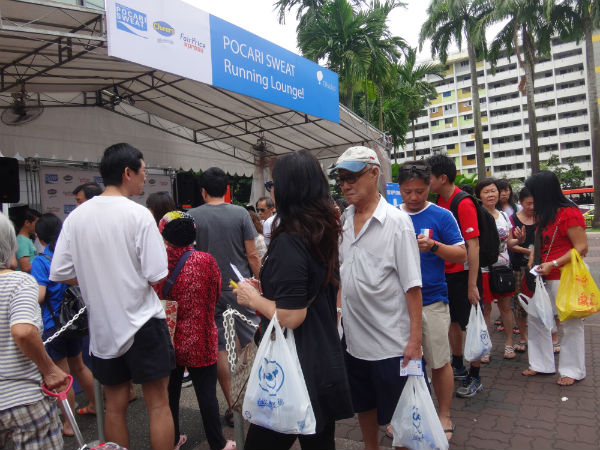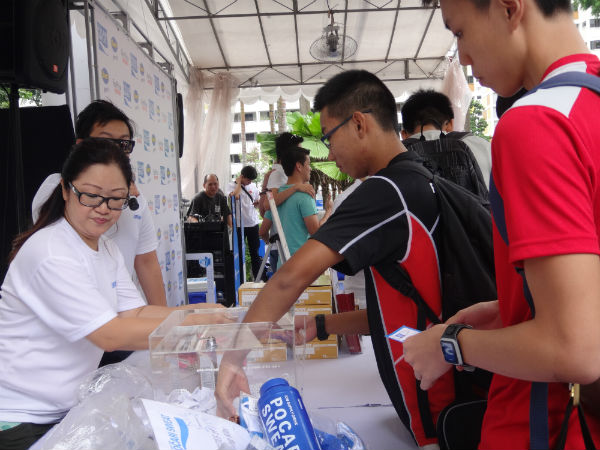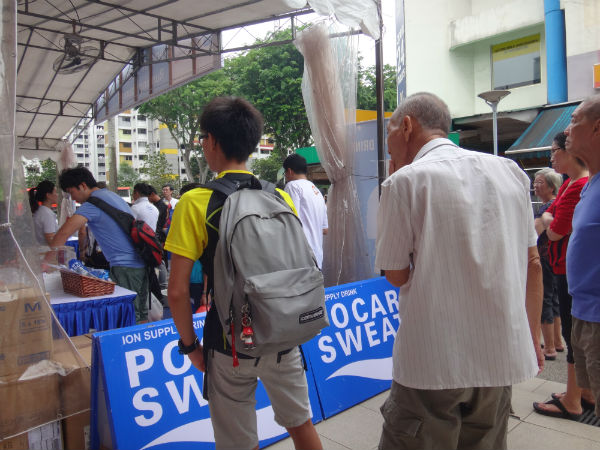To get running tips from Singapore’s top marathoner, Mok Ying Ren, do read on.
Last weekend, South East Asian Gold Medallist Mok Ying Ren fielded questions from runners, at the Pocari Sweat Running Lounge, in Ang Mo Kio.
This event, held at the Ang Mo Kio Hub, gave participants the chance to interact with the Captain (Doctor) in the Army, by asking him questions, getting running advice and taking photos with him.
Here are the highlights of what Mok, 26, shared with runners at the Question and Answer (Q&A) session.
Can you tell us what the experience of winning that gold at the SEA Games was like?
I think I was really emotional because two weeks before the SEA Games, I enlisted for national service, so I had to go through three months of the Medical Officer Cadet Course (MOCC) in the Army, which was about 10 times harder than Basic Military Training (BMT).
Everyone has always been telling me that the MOCC is relaxed and that people put on weight there, but I was really having a hard time, lifting heavy loads and doing push-ups and other exercises. I was having a bad time for the first two weeks – getting back pain and coming down with a cough and it was hard to train.
Normally I spend two to three hours running every day but when I enlisted, I could only run for half an hour per day, so I thought that it would be a tough chance to win the gold. I only wanted to win a medal – that was my initial target.
The race was on Sunday and I could only be in Myanmar on Saturday. I took a four-hour bus ride to the race-site and we did a recce around the route. And when I took a look at the list of all of my fellow competitors, the previous medallists were there too and it was quite daunting.
But I still made it in the end, fortunately. I was very patient during the race. It was a five-loop course and each loop had a lot of hills. In the third loop, I was getting tired but I pushed on and persisted and finally, in the last loop, my competitors got exhausted and slowed down so I managed to catch the person in front of me at the last one kilometre of the race. That was how close it was! At the end of the race, I was so relieved.
You also went to the Gold Coast recently. Tell us about it.
I didn’t have a good run because three days before, I had the flu. I tried to take precautions, but sometimes it is hard. So I went there and ran 10 kilometres and did not do so well.
But it is always amazing to travel with friends. You get to tour around and see the country and that is what I think many runners would do.
Can you tell us any tips for taking up running for beginners?
First of all, for beginners, just find the motivation to run. Find friends to run with and sign up for a short race, such as a 5km run. Then when you have the goal, you start training, but do not push yourself hard every day
Try and take it easy and in fact, for my runs, I train seven days a week and twice a day, but most of my runs are easy. During these runs, I can talk. Only two or three times a week, do I push myself hard and do a long run every weekend. But for the majority of these runs, I can still talk.
And for those who have been running for the past five or ten years and are stuck in a plateau, what tips do you have for them to improve themselves?
Honestly, from what I have been reading, it is about consistency. Make sure you are putting in the runs every week. You don’t want to have a short rest for one to two months. Many student athletes take two to three months off their sport to study for exams and their fitness just drops drastically.
Instead, be consistent and try and put in at least two runs every week even though you are busy with exams or family and your body will remember that it can still run. So the key thing is to be consistent, year in and year out.
At the same time, remember to keep your runs easy. Do one long run a day or two short runs a week and if you keep on doing that, you will build up your own potential.
What are your plans for the future?
Currently, I am still in National Service. I complete it in April next year. Then I will take one and a half years to train in Japan or Kenya. Ultimately, I want to try and qualify for the Olympics in Rio in 2016.
Next year is the South East Asian (SEA) Games in Singapore and that is very important for local athletes – so we are all pushing and training very hard for it. We all hope that Singapore can top the table. So I think it will be a good year and we will all try our best.
How do you choose the right running shoes?
Just wear something comfortable for you. Actually, in Kenya, they do not know what are shoes in the first place. They just get an old pair from a friend and start running.
The important thing is to adapt to your shoes. When you first buy new shoes, start very slowly with them. For example, do one run a week in them and if there are no problems, try and upgrade to two runs a week in those shoes and so forth.
If the shoes fit you well, keep on using them. Once I find a pair of shoes that fit me well, I will keep on using them, even when the model is upgraded. If you find a new pair that you like, then use the same principle. Any shoes can really work but just be careful with them and adapt to the shoes.
What was your 2.4km timing?
I think it was seven minutes and 20 seconds. Last time, when I was in BMT about five or six years ago, I had this certificate that says, ‘First in 2.4km.’
How do you deal with cramps during a race?
Most of the time, cramps happen when you are tired. Interestingly, our muscles need energy to relax. When cramps happen, the muscle is contacted fully and there is no energy left to relax and you need to rest it. It happens a lot of time when we start the race too fast, then cramps will happen at the end.
Prevent it by starting the race at a comfortable effort and finish stronger. There is no such thing as starting fast and hoping to have a time buffer in the later part of the race. You should start with an even pace throughout and finishing the race strongly.
During training, you should try and identify what type of pace you want to run during the race and stick to it so that you do not go too fast. But of course, there are some studies that show electrolytes and drinks can help with cramps.
If these work for you, try it out, but I really think cramps happen because the muscles are fatigued and can be prevented by starting the race at a comfortable pace so that you can finish strongly.
Tell us about hydration during races.
Hydration is very important during a marathon. I ran the 10km at the Gold Coast and there was no sweat on my jersey after the race!
But in Singapore, you are drenched in sweat. One month ago, I ran at the Run for Cover event, a 24-hour treadmill challenge where I ran for half an hour. I actually lost two kilograms from it because it was very hot and humid and I was so surprised by how much water I had lost.
If you are running on the road, I think you tend to lose less than when you are running on a stationary treadmill. Imagine yourself running for half an hour to one hour and if you lose so much fluid, then it only makes sense to replace it. That is where hydration becomes important.
I have a half marathon coming up. How shall I train for it?
A good time to start gearing up is five to six months before the run. But it depends on what your objectives for the race are. Sometimes people just want to complete a race but others want to do well. You want to give yourself more time to prepare and gear up and then tone down your efforts before race day.
What are precautions that runners need to take in order to prevent knee problems?
It is actually not the case that runners always have knee problems even though many people perceive this to be true. Studies have shown that if you compare a runner and a swimmer, there is no difference in their knees.
Running actually stimulates circulation in the joints and helps to prevent arthritis. Rather, you may have a strong chance of arthritis if you are genetically prone, or if you have suffered from knee problems or injuries through playing sports such as football. But if you jog a few times a week, then there is no increased risk.
And if you keep up a routine of jogging or walking, you are actually helping to prevent arthritis. Try to move around, but do not exert yourself too much. Studies have shown that you will not get arthritis if you have been jogging when you were younger.
Do you need any supplements?
It is hard to say. Eat a healthy diet, have your fruits and veggies. Basically, try and eat everything to get a variety of nutrients. But there are so many studies on this area that it is hard to explain this.
Tell us more about your Commonwealth Games preparations.
It is actually in two weeks, on 27 July. I am running the marathon and it is the first time I am representing Singapore. So I want to do well.
Initially, I wanted to break the national record of two hours and 24 minutes but I will see how my shin injury recovers. At the end of the day, you want to do well but don’t want to jeopardise your running career.
How are you gearing up for the Commonwealth Games?
Really, there is nothing much that I can do now, considering that the event is at the end of this month. I want to do my final long run and then start tapering. Now it is about consolidating my efforts done so far, rather than pushing myself all the way.
That is how people should be training. It is no point in pushing yourself to do a long run to get in some last minute training if the race is next week. You really want to rest and enjoy the race.







Leave a Comment